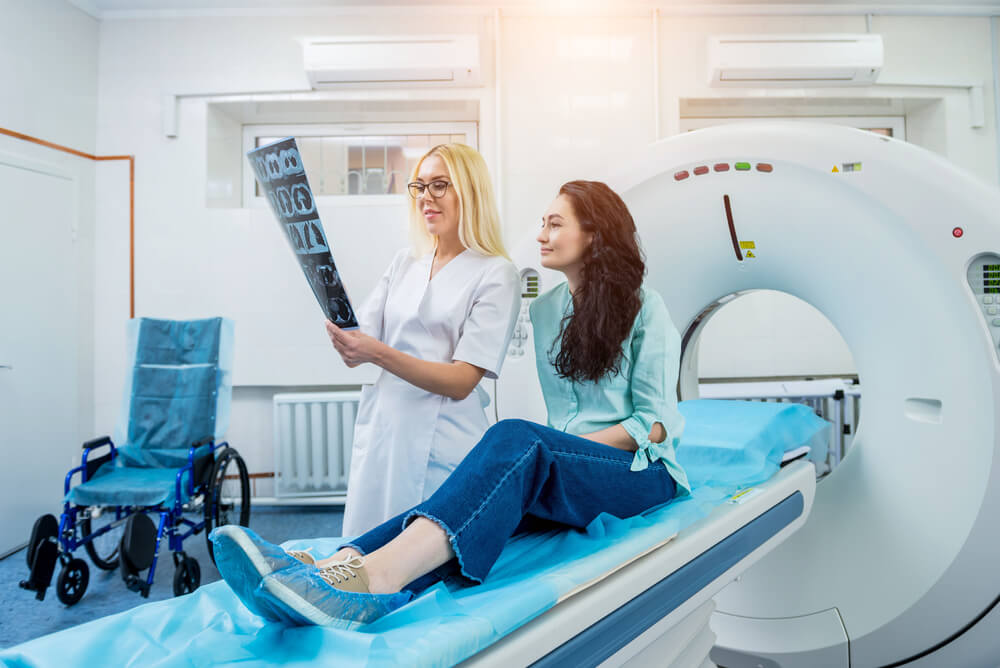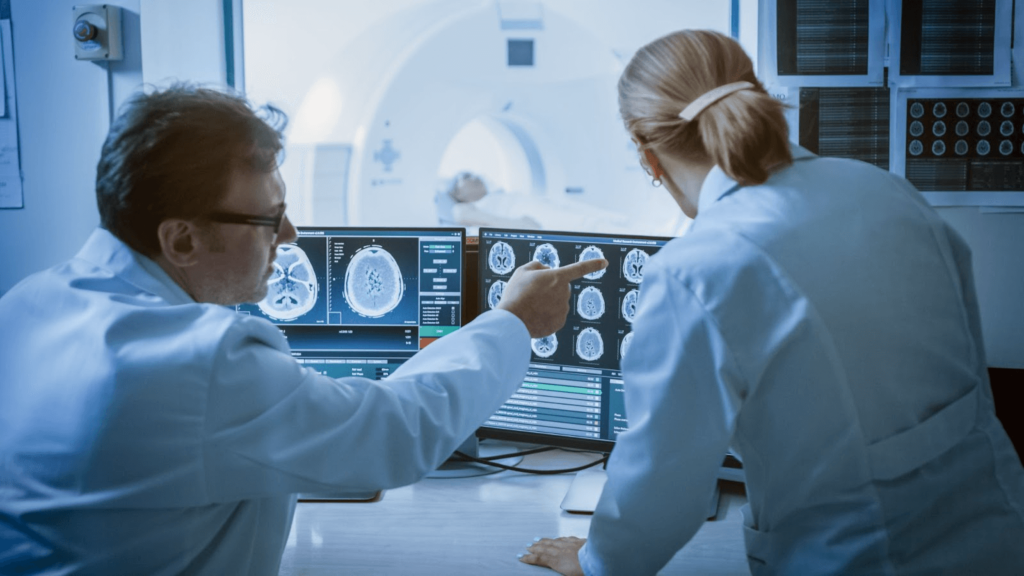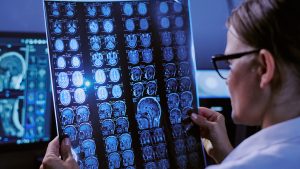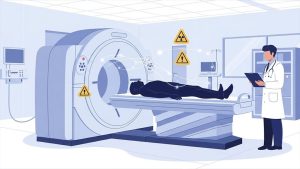Brain CT scans are a vital tool in modern medicine, giving doctors a detailed look inside our brains. They use a series of X-ray images taken from different angles to create cross-sectional views of the brain. This technology helps doctors quickly identify a range of issues, from brain injuries and tumors to strokes and other neurological disorders. In this article, we’ll explore how brain CT scans work, what they can show, and why they’re so important in diagnosing and treating various brain conditions.
What is a Brain CT Scan?
A brain CT (Computed Tomography) scan is an advanced imaging method used by doctors to get a detailed look inside your brain. It’s a non-invasive procedure, which means it doesn’t require surgery or entering the body in any invasive way. The CT scan works by using X-rays, similar to the kind you might have had for a broken bone, but much more sophisticated.
In a CT scan, the X-ray machine rotates around your head, taking multiple images from different angles. These images are then combined using computer technology to create cross-sectional views of your brain. Think of it like slicing a loaf of bread—each slice offers a view of a different part of the loaf, or in this case, your brain. This process allows doctors to see not just the surface, but also the inner structures of your brain in great detail.
CT scan vs. Standard X-ray
The advantage of a CT scan over a standard X-ray is its ability to provide a more complete and detailed view. While a regular X-ray shows a flat, two-dimensional image, a CT scan provides a three-dimensional picture. This level of detail is crucial for diagnosing conditions like brain tumors, hemorrhages, skull fractures, and other brain disorders. It’s also faster than many other imaging tests, making it a go-to choice in emergency situations where time is critical.

What Can a Head CT Scan Detect?
Brain CT scans are incredibly useful for doctors because they can show a lot of different conditions and problems inside your brain. Here’s a look at what these scans can typically reveal:
Brain Tumors
CT scans are highly effective in spotting both benign (non-cancerous) and malignant (cancerous) growths in the brain. By identifying the size, location, and nature of these tumors, doctors can determine the best course of action for treatment.
Brain Injuries
In cases of head trauma, a CT scan can assess the extent of the damage. It helps in detecting fractures in the skull, bleeding, bruising, or swelling of the brain. This is crucial for deciding on immediate treatments and understanding the potential long-term impact of the injury.
Stroke
One of the key uses of a brain CT scan is to detect strokes. It can show areas where there might be bleeding or blood clots in the brain. This information is vital because the treatment for a stroke caused by bleeding is different from one caused by a clot.
Infections
If there’s an infection like an abscess (a pocket of pus) or encephalitis (inflammation of the brain), a CT scan can highlight these areas. Identifying infections quickly is important for starting the right kind of treatment as soon as possible.
Other Conditions
There are several other conditions that a brain CT scan can help diagnose. This includes hydrocephalus (build-up of fluid in the brain), brain atrophy (shrinkage of brain tissue), or vascular malformations (abnormal blood vessels in the brain).

Indications for Brain CT Scans
Brain CT scans are not just used randomly. They are performed for specific medical reasons. Here are some of the key situations where a brain CT scan is typically indicated:
Headaches and Migraines
While most headaches and migraines are not due to serious issues, sometimes a CT scan is needed. This is especially true if headaches are severe, sudden, or different from usual, as they could indicate underlying problems like a tumor or bleeding in the brain.
Traumatic Brain Injuries
After a head injury, such as from a fall or car accident, a CT scan is often done to check for any serious damage. It can quickly show fractures in the skull, bleeding, or bruising in the brain, which are critical to diagnose right after the injury.
Seizures and Epilepsy
For someone experiencing new or uncontrolled seizures, a CT scan can help find the cause. It can show structural abnormalities in the brain that might be triggering the seizures.
Stroke and Cerebral Hemorrhage
In the case of a suspected stroke, a brain CT scan is usually one of the first tests done. It can show whether the stroke is caused by a blood clot (ischemic stroke) or bleeding in the brain (hemorrhagic stroke), which is essential for deciding on the correct treatment.
Tumors and Masses
If there’s a suspicion of a brain tumor or other masses, a CT scan can provide detailed images of the abnormal growth. It helps in determining the size, location, and potential impact of the tumor on surrounding brain structures.
CT Scans vs. Other Imaging Techniques
When it comes to brain imaging, doctors often choose between CT scans and MRI scans based on the situation’s specific needs. Let’s break down how these two techniques compare:
Speed and Suitability in Emergencies: CT Scans
- Fast and Efficient: CT scans are much quicker than MRI scans. This speed is crucial in emergencies, such as strokes or severe head injuries, where rapid diagnosis can be life-saving.
- Detecting Urgent Conditions: CT scans excel at identifying immediate concerns like hemorrhages (internal bleeding in the brain) and skull fractures. They provide quick and clear images of bone structures and blood flow, which are essential in these urgent scenarios.
Detailed Imagery: MRI Scans
- High-Quality Images: MRI scans are known for producing highly detailed images, especially of soft tissues. This makes them more suitable for diagnosing complex brain disorders, chronic conditions, and tumors.
- Non-Urgent Situations: Since MRI scans take longer to perform, they are less ideal for emergency situations. They are used when doctors need a more comprehensive view of the brain’s soft tissue, and detailed imaging is more critical than speed.

When to Talk to Your Doctor About a Brain CT Scan
Knowing when to discuss the possibility of a brain CT scan with your doctor is important for your health. Here are some situations where a brain CT scan might be necessary:
Severe Headaches
If you’re experiencing unusually severe headaches, especially if they come on suddenly or are different from any headaches you’ve had before, it’s worth mentioning to your doctor. These could be signs of serious conditions that a CT scan can help diagnose.
Sudden Changes in Vision or Speech
These symptoms can indicate a range of issues, from stroke to brain tumors. A CT scan can help identify the cause of these sudden changes.
Loss of Consciousness
If you’ve fainted or lost consciousness, even briefly, it’s a good idea to get checked out. A brain CT scan can determine if there’s an underlying issue that needs to be addressed.
Head Injury
After a head injury, especially if it’s severe or if you have symptoms like confusion, dizziness, or nausea, a CT scan can be crucial to assess any potential damage to the brain.
Empowering Your Health Journey
Brain CT scans are essential in diagnosing and treating various neurological conditions. They give doctors a clear picture of what’s happening inside your brain, which is crucial for effective treatment. At One Step Diagnostic, we’re committed to providing top-notch brain CT scan services. Our state-of-the-art technology and experienced team ensure that each patient receives personalized care.
Whether you need a brain CT scan for diagnostic purposes or as part of ongoing treatment, we’re here to support you on your health journey. Visit us at One Step Diagnostic to explore our range of services and see how we can help you maintain optimal brain health.




